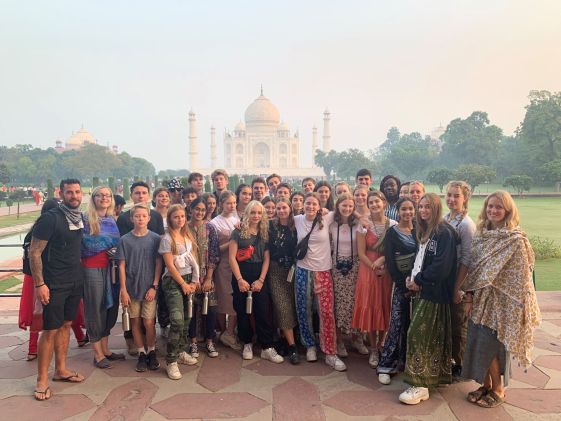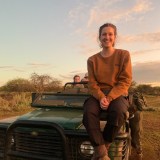Developing a responsible approach to school trips
How can school travel be justified in this day and age? Is responsible school travel in fact possible? Polly Sadler, content coordinator at ‘alternative’ travel company Flooglebinder looks at the issues.
A new era of responsible green travel
Let’s face it, travel doesn’t have the best reputation at the moment when it comes to environmental sustainability or social impact. Stories about the industry’s contributions to global emissions, pollution, and habitat loss are all too familiar and yet in talking to an audience of teachers (especially international teachers) we are probably preaching to the converted when we say that we think travel is still important.
We all know, travel can enhance cultural understanding, and if undertaken with thought and sensitivity, it can raise awareness of inequality, poverty, environmental degradation and the imbalances that are part and parcel of the modern world. Travel really does remain the best way to broaden the mind. With or without travelling, over-consumption will always be an issue in the profit-based world we live in unless change can happen on a behavioural level. And therein lie the benefits: travel fosters mindfulness by encouraging individuals to live in the moment, away from the distractions of electronics and social media; it provides alternative learning opportunities, particularly beneficial for those who struggle in traditional classroom settings; and offers moments of achievement, whether conquering a challenging trek or simply ordering food in a foreign language. Travel can also allow people to experience the problems that the world is facing in an in-situ, hands-on environment.
Travelling differently
But before we travel these days, we have to think about it – something that is especially important for a company like ours if we are not to be accused of ‘greenwashing’.
Particularly important for us was our application to become a ‘B-Corp’ Company. Certified B Corporations (https://www.bcorporation.net/en-us/certification/) are leaders of a global movement of people using business as a force for good. They meet the highest standards of overall social and environmental performance, transparency and accountability and aspire to use the power of business to solve social and environmental problems.

Achieving B-Corp certification was not easy, but it has been a vital benchmark for us. As the first B Corp travel company in the UK (still the only one in the education sector) we are also a Travelife partner (https://travelifesustainability.com/). As such we endeavour to help people travel better — for themselves, the communities they visit, and the planet. We track, monitor and reduce our scope 1, 2 and 3 emissions to a Gold Standard in line with the UN Carbon Neutral Now initiative, and were one of the first travel companies in the UK to set Science Based-Targets, calculating our emissions with Green Element (https://www.greenelement.co.uk/) and offset through Green Future Project (https://greenfutureproject.com/) Additionally, we work with two nature reserves on conservation projects in Ecuador to mitigate further deforestation and enhance biodiversity.
Balance

You can have all the certification in the world, but if the outcome of the trip is worth less than its carbon cost we are not doing our job, which in the long run is to curate adventures that inspire positive change. We strongly believe in the transformative impact of travel for fostering positive mental health, personal development and behavioural change.
Ultimately our claim is that the overall positive impact of our trips must be greater than the initial carbon footprint of the flights. We do this in two ways. Firstly the schools we work with develop an awareness of their carbon footprint and learn how they can work to minimise and offset this. Secondly, trips are designed to promote and encourage positive social and environmental impact. We are aligned with the UN’s Sustainable Development Goals, and hope that our diverse educational study tours give students of all ages a deeper understanding of conservation, the global issues our planet faces, and how they can make a difference. Here are a few examples of what we do, and how we try to do it, as respectful visitors, rather than as supposed experts with all the answers.
Wales

For our project trip in Wales project, which takes place on the picturesque Pembrokeshire coast, groups get involved in a beach clean for Surfers Against Sewage (https://www.sas.org.uk/). Seeing at first-hand the extent of litter and its effects on marine life can be life-changing. Students also learn about local seaweed farming initiatives that could provide a sustainable alternative to plastic in the future. By actively participating in clean-up efforts, the participants take ownership of the problem and learn to recognise their role in addressing it – from reducing single-use plastics and changing their purchasing behaviour, to correct disposal.
Thailand
 In the Kui Buri National Park, working closely with rural communities exposes students to the environmental challenges faced by these communities, such as conflicts between elephants looking for food and water, and villagers striving to protect their property, homes and farms. Participating in community projects empowers students to make a positive difference in their own communities. They develop a deeper understanding of how big world issues translate into local needs, learn more about themselves and the culture in which they are immersed, and develop communication and leadership skills along the way.
In the Kui Buri National Park, working closely with rural communities exposes students to the environmental challenges faced by these communities, such as conflicts between elephants looking for food and water, and villagers striving to protect their property, homes and farms. Participating in community projects empowers students to make a positive difference in their own communities. They develop a deeper understanding of how big world issues translate into local needs, learn more about themselves and the culture in which they are immersed, and develop communication and leadership skills along the way.
Peru
 The Peru trip takes the participants deep into Manu National Park to an area teeming with endemic, yet threatened birdlife and endangered species such as the emperor tamarin monkey and giant river otter. Here, the students learn how to survey and monitor wildlife in a bid to better understand the species present, many of which are declining in numbers due to a combination of exploitation, loss of habitat through deforestation, mining and increase of human population. Hearing first-hand from locals who are affected allows the students to gain insights into the interconnectedness of ecosystems and human activities, motivating them to become advocates for environmental conservation and sustainable development.
The Peru trip takes the participants deep into Manu National Park to an area teeming with endemic, yet threatened birdlife and endangered species such as the emperor tamarin monkey and giant river otter. Here, the students learn how to survey and monitor wildlife in a bid to better understand the species present, many of which are declining in numbers due to a combination of exploitation, loss of habitat through deforestation, mining and increase of human population. Hearing first-hand from locals who are affected allows the students to gain insights into the interconnectedness of ecosystems and human activities, motivating them to become advocates for environmental conservation and sustainable development.
Schools and carbon neutrality
Trips are one thing, but they will, ultimately only be a small part of what a school does during a year. Schools who want to travel responsibly may also have aspirations to achieve carbon neutrality. However, this just isn’t easy. Having gone through this ourselves, we have also developed our Gamechanger Programme, which involves providing three strands of support:
- Developing a Sustainability Action Plan – we conduct a thorough analysis to identify sources of carbon emissions, energy consumption patterns, waste generation, and other environmental factors and develop a tailored Sustainability Action Plan outlining specific goals, strategies, and timelines for reducing carbon emissions and improving sustainability practices.
- Organising an MEP Asset Management Plan – in this phase, we focus on managing the institution’s Mechanical, Electrical, and Plumbing (MEP) assets to enhance energy efficiency and reduce carbon footprint and develop recommendations for retrofitting, upgrading, or replacing MEP systems with energy-efficient alternatives.
- Developing a school’s Education Programme – step 3 involves developing educational materials, workshops, and training sessions to raise awareness about climate change, carbon neutrality, and sustainable practices. We integrate and map the learning objectives with the activities on our trips, so that the residential strategy aligns with a school’s emerging sustainability strategy. These resources – along with experiential learning – empower individuals to take action and contribute to the institution’s sustainability goals.
Believing in what we do
The way we work is different, but we believe in what we do. If you’d like to know more and put us through our paces, this is where you can find us: https://flooglebinder.co.uk/
In the meantime, this is what one or two schools have said about us: https://flooglebinder.co.uk/reviews
 Polly Sadler is Content Coordinator at Flooglebinder
Polly Sadler is Content Coordinator at Flooglebinder
Thank you to Polly and Flooglebinder and Surfers Against Sewage for their kind permission to use these images.

